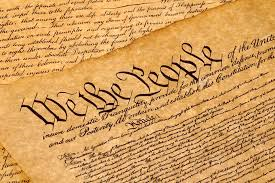by Peter Pavarini

The Commonwealth of Virginia’s belated attempt to approve the 1972 Equal Rights Amendment has brought to the forefront one of the primary reasons for the political chasm dividing Americans today.
For those calling for the repeal of the Electoral College and the Second Amendment, limiting the President’s executive authority or changing the way federal judges are appointed and confirmed, the intentionally arduous amendment process outlined in Article V of the U.S. Constitution is no longer acceptable. Indeed, a growing number of people, particularly on the Left, say the world’s oldest constitution is so outdated it should be entirely re-written for a modern society.[i]
A Herculean Task. Frustrated by the herculean task of holding a Constitutional Convention, there are some who believe the United States doesn’t need a constitution. After all, the U.K. and Canada seem to get by okay without a formal constitution. Why should we be stuck with one that was written by a bunch of long-dead white men in the Eighteenth Century?
A popular off-Broadway play, “What the Constitution Means to Me”, has a 15-year old member of its cast asking the audience whether this historic document ought to be abolished. As a recent poll of Millennials[ii] suggested, a supposedly racist, homophobic nation bent on destroying itself and the rest of the globe with fossil fuels probably doesn’t deserve to have its founding document enshrined any longer.
This got me wondering what our country would be like in the absence of the Constitution – with or without its imperfections.
Let’s start with the generally accepted definition of a constitution – a body of founding principles or established precedents according to which a state or organization is governed. The overwhelming majority of democratic nations have a document which represents their constitution. Admittedly, there are different types of constitutions, both codified and uncodified.[iii] However, even nations without a formal constitution, like those mentioned above, or others like Israel or Saudi Arabia, look to various precedential documents for their founding principles. In the case of Saudi Arabia, it’s Sharia law.
In contrast, most notoriously undemocratic nations either don’t have a constitution or ignore the one they have. Efforts to transform failed states like Somalia and Haiti into democracies are often stymied by their inability to adopt a constitution.
Early America Without a Constitution. It’s not as though the United States never tried going without a constitution. During the first few years following the Treaty of Paris, our fledgling country operated under the Articles of Confederation. At that point, we were just a small group of autonomous states. We shared little in the way of communication, transportation or commerce, and our regional differences left us vulnerable to foreign powers, particularly in matters of trade. Not surprisingly, there was a legitimate fear that European nations would try to re-colonize the states. On top of this, a severe economic recession caused popular discontent from New England to the Deep South. As evidenced by the Shays’ Rebellion, the threat of an armed revolt was real. By 1786, the Congress was utterly deadlocked and incapable of addressing any of these problems. Out of this mess came the Philadelphia Convention that gave birth to our Constitution.
In his paper “The Rights of Man”, Thomas Paine explained the purpose behind drafting a constitution:
“That men mean distinct and separate things when they speak of constitutions and of governments, is evident: or why are those terms distinctly and separately used? A constitution is not the act of a government, but of a people constituting a government; and government without a constitution, is power without a right.
“All power exercised over a nation, must have some beginning. It must either be delegated or assumed. There are no other sources. All delegated power is trust, and all assumed power is usurpation. Time does not alter the nature or quality of either.”[iv]
I recommend reading the rest of Paine’s work if you want a better understanding of why our Founders chose to create a constitutional republic rather than some other form of government.
Constitutional Interpretation. It wasn’t all that long ago that Democrats like Barack Obama, a constitutional law professor before he entered politics, said “conservative or liberal, we are all constitutionalists.”[v] Since his presidency ended, members of his political party regularly attack the Constitution as “anti-democratic” and “oppressive”. Constitutional scholars like Harvard Law School’s Sandford Levison question whether they would have put their signature to the original document had they been alive in 1787. Progressive writers like Garrett Epps, also a constitutional law professor, dismiss arguments made by Libertarians like former U.S. Representative Ron Paul that “the Constitution was written explicitly for one purpose – to restrain the federal government”. [vi]
On the other hand, conservative originalists like Mark Levin believe we as a nation have strayed so drastically from the Founders’ intent that the damage done is “irredeemable”. Levin believes we are already living in “a post-constitutionalist era”.[vii]

Americans can certainly have an honest debate over whether the U.S. Constitution is a “living document” or something that must be interpreted as it was intended to be read when written. However, my greatest fear is not that the federal judiciary, especially the U.S. Supreme Court, will occasionally misinterpret the Constitution (as it has clearly done over the past two centuries), but rather that younger Americans have not been properly educated to understand why the United States is the world’s oldest constitutional democracy.
Fleeing to Other Countries. As more and more young people say they would prefer to live in a socialist nation, even if that means giving up the constitutional rights taken for granted in this country (e.g., presumption of innocence, free speech), the number of foreign nationals desperate to enjoy our freedoms here continues to escalate. Would that be true in the absence our Constitution? I think not.
[i] E.g., Sanford Levinson, “The Constitution Needs a Reboot”, Politico Magazine, September/October 2018 (“The bitter truth is that Donald Trump’s presidency is a Frankenstein’s monster in part created by the Constitution itself, and sustained by a political class wrongly to worship as scripture a document whose deep flaws are becoming clearer day by day.”)
[ii] “The World’s Best Countries for Working Millennials Revealed”, www.studyinternational.com, October 3, 2019.
[iii] “Different Types of Constitutions”, www.lawteacher.net, February 2, 2018.
[iv] “Applying Principle to Practice”, Chapter 4 – Of Constitutions, Part 1.
[v] B. Obama, The Audacity of Hope (2006).
[vi] G. Epps, “Constitutional Myth #2: The Purpose of the Constitution is to Limit Congress”, The Atlantic, June 1, 2011.
[vii] Jeffrey Toobin, “Our Broken Constitution”, The New Yorker, December 1, 2013.

Be First to Comment